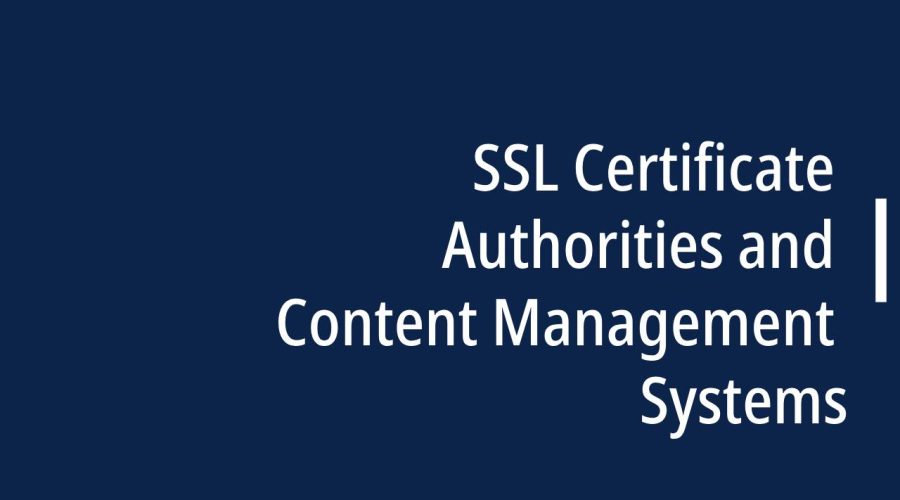SSL (Secure Sockets Layer) certificates play a crucial role in this endeavor by encrypting data and establishing trust between your website and its visitors. Choosing the right SSL certificate authority (CA) is essential, and this choice can vary depending on the Content Management System (CMS) you use. In this comprehensive guide, we’ll delve into the usage of SSL certificate authorities, broken down by various popular CMS platforms.
-
WordPress:
WordPress is the most popular CMS globally, known for its user-friendliness and extensive plugin ecosystem. SSL certificate integration is a breeze, and a range of CAs are used:
- Let’s Encrypt: Let’s Encrypt is a favorite choice due to its free SSL certificates, with plugins like “Really Simple SSL” facilitating easy integration.
- DigiCert: A trusted CA that offers robust security features.
- GoDaddy: A renowned web hosting company, also offering SSL certificates.
- GlobalSign: Known for its reliability and compliance.
-
Joomla:
Joomla is another widely used CMS with a strong community. Users can choose from various CAs, including:
- DigiCert: A trusted choice for securing Joomla websites.
- GlobalSign: Known for international presence and strong brand recognition.
- Sectigo (formerly Comodo): Offers a variety of certificate types.
- Let’s Encrypt: Often used via plugins and extensions.
-
Drupal:
Drupal is famous for its robust security and flexibility, supporting SSL certificates from various CAs:
- Let’s Encrypt: Ideal for budget-conscious users with free SSL certificates.
- GlobalSign: Known for its global presence and strong compliance.
- Sectigo: Offers a wide range of SSL solutions.
- DigiCert: Trusted for its reliability and security.
-
Magento:
Magento is an e-commerce-focused CMS, making SSL crucial for securing online transactions. Popular CAs include:
- DigiCert: Offers robust e-commerce solutions.
- GlobalSign: Trusted for its security and compliance.
- Sectigo: Tailored solutions for e-commerce websites.
-
Shopify:
Shopify is a hosted e-commerce platform, providing SSL certificates for all users. These certificates are reliable, ensuring the security of online stores.
-
Wix:
Wix is a popular website builder, offering integrated SSL certificates managed by the platform itself. Users do not need to purchase certificates separately.
-
Squarespace:
Squarespace, another website builder, offers built-in SSL certificates, ensuring the security of websites. SSL management is streamlined, and users do not need to buy certificates separately.
-
Ghost:
Ghost is a versatile CMS for bloggers, and it can be self-hosted or used as a hosted service. Users can choose from various CAs, including:
- Let’s Encrypt: Ideal for those who prefer free SSL certificates.
- DigiCert: Trusted for reliability and security.
- Sectigo: Offers a wide range of SSL solutions.
-
Typo3:
Typo3 is a versatile CMS that offers flexibility in choosing SSL certificates. Users can obtain SSL certificates from various CAs, including:
- Let’s Encrypt: Ideal for budget-conscious users.
- DigiCert: Trusted for reliability and security.
- GlobalSign: Known for its global presence and strong compliance.
-
Weebly:
Weebly is a user-friendly website builder, offering SSL certificates as part of its services. SSL management is streamlined for Weebly users, with certificates provided by the platform.
Choosing the Right SSL Certificate Authority
The choice of SSL certificate authority should align with the specific needs of your website, the level of validation required (e.g., domain validation, organization validation, or extended validation), and your budget. The trustworthiness and reputation of the CA are also vital factors to consider.
In conclusion, the usage of SSL certificate authorities can vary depending on the content management system you use. Your choice should align with the CMS’s requirements and the desired level of security for your website or web application. Secure your site with the right SSL certificate and provide your visitors with a safe and trusted browsing experience.

Gloria Bradford is a renowned expert in the field of encryption, widely recognized for her pioneering work in safeguarding digital information and communication. With a career spanning over two decades, she has played a pivotal role in shaping the landscape of cybersecurity and data protection.
Throughout her illustrious career, Gloria has occupied key roles in both private industry and government agencies. Her expertise has been instrumental in developing state-of-the-art encryption and code signing technologies that have fortified digital fortresses against the relentless tide of cyber threats.
